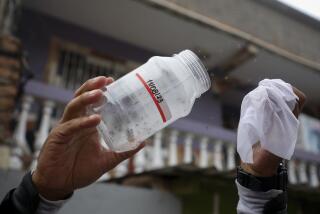Ebola: Gates Foundation funds convalescent plasma research
As a group of celebrities that includes Bono, Will Ferrell, Morgan Freeman and Ben Affleck calls for increased efforts to battle Ebola, the Bill & Melinda Gates Foundation announced that it was contributing $5.7 million for the study of an experimental blood-based treatment.
“The initial response to the Ebola outbreak was too slow and too uncoordinated,” said Michael Elliot, president of the advocacy organization ONE, which launched a celebrity-studded media campaign Wednesday.
“Some countries have now stepped up to lead in a big way -- with traditional donors like the U.S., U.K., France and Germany all making meaningful contributions -- but this is a global crisis and it demands a global response,” Elliot said in a prepared announcement.
The campaign includes a video of the performers sitting silently before a camera, “waiting” for the world to take action; an Internet petition drive, and an “Ebola Response Tracker.” The tracker shows how much money has been pledged by nations versus how much has actually been spent.
The effort comes as 66% of Americans express concern that the world beyond the United States would see a large number of Ebola cases over the next year, according to a survey released Wednesday by the USC Schaeffer Center for Health Policy and Economics and the USC Dornsife Center for Economic and Social Research.
Of 925 individuals interviewed across the nation, 31% said they were concerned that the virus might strike themselves or their family. The survey also concluded that 77% of respondents got their information on Ebola from television. By comparison, only 43% learned about Ebola from newspapers; 32% from Internet search engines; and 17% from public health officials.
According to the World Health Organization, at least 5,420 people have died of Ebola during this outbreak, with a total case count of 15,145. (The WHO acknowledges that its weekly case counts underestimate the true number Ebola cases.) Most of the cases have occurred in three West African nations: Guinea, Sierra Leone and Liberia.
In effort to fight the disease, which is spread through contact with bodily fluids, the WHO has approved the use of experimental drugs and convalescent plasma. That action was taken three months ago, but production issues and ethical debates have delayed the rollout of these treatments.
On Tuesday, the Gates Foundation said it was committing $5.7 million to help launch a trial that will evaluate the use of convalescent blood plasma and various drug candidates, including the antiviral compound brincidofovir.
To date, the foundation has invested about $40 million of an original $50 million commitment to fight Ebola, said a foundation spokesman, Trevor DeWitt. Roughly $30 million has gone to support the emergency response and improved disease surveillance, and the remainder to research and development investments.
Blood plasma is the clear part of blood that contains antibodies. Researchers say that by taking this plasma from people who have survived an Ebola infection and are no longer sick and giving it to people who are infected with the virus they may be able to boost a patient’s immune response.
The technique, although used in a number of high-profile Ebola cases in the West, remains unproven and critics say its use may be impractical in West Africa, due to the risk of passing along other blood-borne pathogens and the lack of proper equipment and medical staff.
The Gates Foundation initiative, which includes more than a dozen partners, will attempt to address these concerns by providing three bus-like mobile donation units, as well as technology that will inactivate a number of blood pathogens.
“Ebola survivors who are potential donors will be tested to ensure that they are cured of Ebola and are not infected with other blood-borne diseases,” said a foundation news release. “For added safety, the trial’s use of pathogen inactivation technology will substantially reduce the risk of any transfusion-transmitted infection from blood components.”
Blood plasma will be collected in a process called plasmapheresis, in which whole blood is collected from a donor and separated into plasma and red blood cells. The red blood cells are then returned to the donor while the plasma is used to treat a patient.
Each air-conditioned blood collection unit will be equipped with four beds, a reception area, and a lab space equipped with a pathogen inactivation system, said Vicki Tifft, president and chief executive of Clinical Research Management Inc., which is overseeing the trial.
“These self-sufficient units are not intended to travel around West Africa, but rather be stationary clinics associated with hospital facilities in each of the affected areas,” Tifft said in an email. “The mobile units will operate using permanent electrical lines or generators depending on the power supply for each hospital.”
The technology that will be used to inactivate blood pathogens was developed by the Concord, Calif., firm Cerus Corp. The photochemical technology, which is called INTERCEPT is awaiting FDA approval, but has been authorized for use under an investigational device exemption.
According to a company statement, INTERCEPT uses ultraviolet light to activate an added compound that prevents the replication of DNA and RNA.
Follow @montemorin for science news







